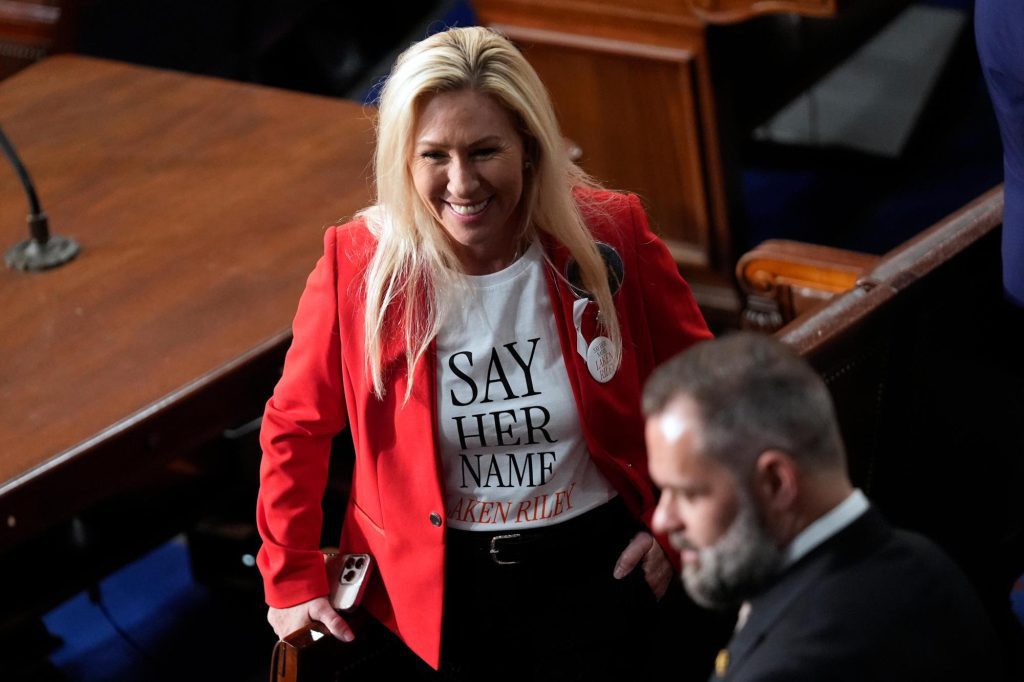By GRAHAM LEE BREWER (Associated Press)
Marjorie Taylor Greene wore a T-shirt with the message: Say Her Name to the State of the Union address on Thursday night.
The staunch Republican congresswoman from Georgia, who was wearing a red MAGA hat and other symbols, borrowed the phrase from Black activists who have been raising awareness about the deaths of Black women by police and vigilantes.
However, Greene used the chant to provoke President Joe Biden into saying the name Laken Riley, a nursing student from Georgia whose death has become the focus of the U.S. immigration debate. An immigrant from Venezuela, who entered the U.S. illegally, has been arrested in connection with Riley’s case and charged with murder.
Riley’s name has become a rallying cry for Republicans criticizing the president’s handling of the surge of immigrants entering the country through the U.S.-Mexico border.
The origins of the ‘Say Her Name’ chant go back well before Greene wore the T-shirt.
Civil rights activist, law professor and executive director of the African American Policy Institute Kimberlé Crenshaw popularized the phrase in 2015, after the death of Sandra Bland. Bland, a 28-year-old Black woman, was found dead in a Texas jail cell a few days after she was arrested during a traffic stop. Her family questioned the circumstances of her death and the validity of the traffic stop, and the following year settled a wrongful death lawsuit with the police department.
Black women are more likely than other women to witness and experience police violence, including death, which is also linked to increased psychological stress and various negative health outcomes.
“We see the appropriation of progressive and inclusive concepts everywhere in an attempt to devalue, distort and suppress the movements they have been created to advance,” Crenshaw said in a statement to The Associated Press. “When most people only hear about these ideas from those that seek to repurpose and debase them, then our ability to speak truth to power is further restricted.”
Greene’s use of the phrase “undermines civil rights movements and pushes our democracy closer to the edge,” Crenshaw wrote in her statement. “The misuse of these concepts by others who seek to silence us must be resisted if we are to remain steadfast in our advocacy for a fully inclusive and shared future.”
Tamika Mallory, a racial justice advocate and author, said Laken Riley deserves justice, but in this case she doesn’t think that conservatives are being genuine when they use #SayHerName. “If they were, they wouldn’t be using language that they claim not to favor,” she said. “They demonize our language, they demonize our organizing style, but they co-opt the language whenever they feel it is a political tool.”
Crenshaw and others started using the phrase to highlight cases in which Black women face police violence. In 2020, the hashtag #SayHerName helped bring more public attention to the shooting death of Breonna Taylor, a 26-year-old Black woman in Louisville, KY who was shot and killed in her home during a botched police raid.
The campaign was created to end the silence about Black women, girls, and femmes who have been killed by police, according to Crenshaw.
“There are many women who have been killed in confrontations with law enforcement, and their families are still seeking justice. Some of the names we highlight include Tanisha Anderson, Michelle Shirley, Sandra Bland, Miriam Carey, Michelle Cusseaux, Shelly Frey, Breonna Taylor, Korryn Gaines, Kayla Moore, Atatiana Jefferson, and India Kager. We need to speak out against and oppose the attempt to use this campaign for an extremist right-wing agenda.”
____
Graham Lee Brewer is part of AP’s Race and Ethnicity team based in Oklahoma City.









